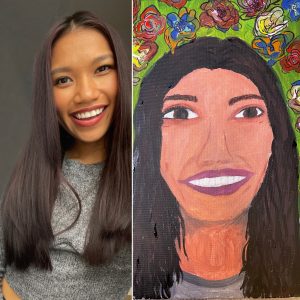9 Camille Molas
Reflection: A self-portrait and commentary on authorship

What does it mean to be an author? How does a story change based on who the author is? Does it matter? These are the questions running through my head as we further our discussion on the Illiad and honestly, any other texts.
My name is Camille Molas and I experience the world visually. Even ideas become pictures or the words on a page dance off of it so that I can literally “see” the words moving. It’s just how I have been able to fully understand my surroundings. I thought that I should bring this “visual” aspect of my life into understanding authorship.
I wanted to paint myself based on my reflection- since this is the only way I can see myself, while others see the “flipped” version of me. I used a mirror to look at myself deeply and painted as I looked.
It’s strange that I only ever see a reflection of me! But others get such a different perspective. This made me think about how authors can create a work that only they have seen through their eyes but someone else can be viewing it from another point of view even if the author themselves have never seen that perspective.
As the painter of my own portrait, I found it so difficult to truly capture my face and put it on the canvas. Maybe this is because I am not a very experienced artist or I am probably just bad at painting. Nevertheless, no matter how much I stared at myself, the canvas just never looked 100% me. Authors may try to do this and try to describe EXACTLY what’s going on or trying to portray something, but in reality, it may not come out as 100% as they intend it to be (even if they are the best author in the world). There’s just something about failing to reach 100% of what you are fully describing. When I began to paint my features, I was so tempted to enhance my portrait, perhaps making my nose smaller or making my face more symmetrical. While I tried hard not to succumb to those enhancements, ultimately subconsciously I did end up enhancing my face in some type of way. Authors can try their VERY HARDEST to be impartial, unbiased, removed from their writing but in practice that is just not achievable. At some point, they eventually enhance, dramatize, leave out, or bias their writing from their lived-experiences.
If my painting was created by someone else, people might feel more inclined to believe that it is truly me and that’s how I look like, versus thinking that I made myself prettier since I painted it. Or perhaps an enemy of mine painted that photo, viewers could feel that I might be better looking and that the painter intentionally made it ugly since I am their enemy. My point is, when it comes to writing, the author clearly has a big influence on the piece whether they are the narrator or not. Perspective from a specific person can change the meaning of the same sentence or word, thus changing the story. Authors can never be removed from the work itself.
There’s still more to uncover when it comes to authorship. However, as an author, I want to be clear about my own biases and my own perspective- not only to be blinded by it but also to use it and be empowered by it. My perspective matters in the world of Classics academia. But I am reminded that my reflection may never actually be seen by others but only by myself.
